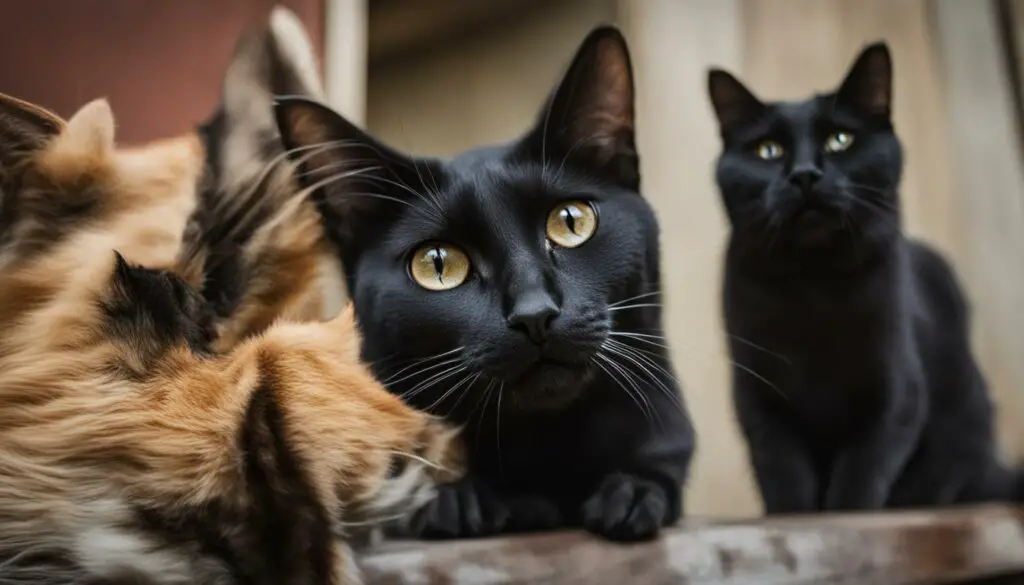Cats are often seen as independent and aloof, but did you know they can be quite forgiving? Understanding feline behavior is key to unlocking their capacity for forgiveness. As a cat lover and owner, I’ve delved into the fascinating world of cats to explore their social nature, communication methods, and memory capabilities. Join me as we uncover the factors that influence a cat’s willingness to forgive.
Key Takeaways:
- Cats are social animals that form strong bonds with their owners.
- They communicate through vocalizations, body language, and scents.
- Cats have impressive memory abilities and can recall past experiences.
- The bond with their owners, sensing emotions, and the environment can influence a cat’s forgiveness.
- Having a forgiving cat as a pet strengthens the bond, reduces stress, and increases affection.
Understanding Feline Behavior
Before delving into the topic of feline forgiveness, it is essential to gain a deeper understanding of feline behavior. Despite their reputation for being solitary creatures, cats are actually social animals that form close bonds with their owners and other cats. They rely on routine and familiarity to feel secure and communicate through various vocalizations, body language, and scents.
Cats are known for their independent nature, but they still value social interaction and connection. They form strong bonds with their owners and show signs of distress when separated from them. Cats also engage in social behaviors such as grooming and playing with other cats, which help establish social hierarchies and maintain group cohesion.
Communication is an important aspect of feline behavior. While cats may not be as vocally expressive as some animals, they have a wide range of vocalizations and body language cues that they use to convey their intentions and emotions. Understanding these forms of communication is crucial in building a strong bond with your cat and avoiding misunderstandings and conflicts.
Memory also plays a significant role in feline behavior. Cats have impressive memories and can recall past experiences and interactions. This ability to remember events can shape their behavior, as they may be more wary of someone who has mistreated them in the past or more likely to trust and forgive someone they have had positive experiences with. Cats also have spatial memory, allowing them to navigate their environment with ease.
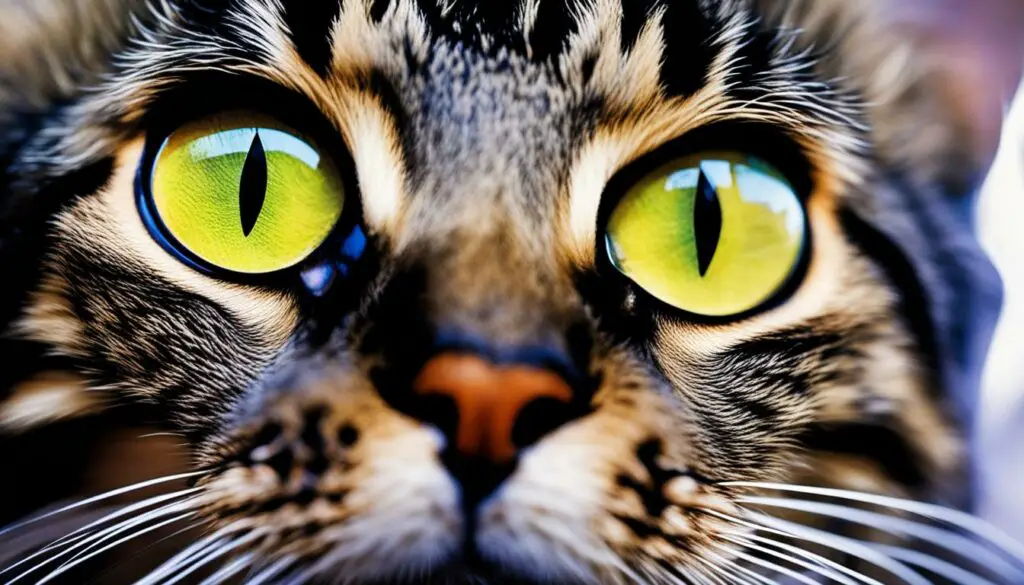
The Social Nature of Cats
| Social Behaviors | Explanation |
|---|---|
| Grooming | Cats groom each other as a way of bonding and showing affection. It helps establish social hierarchies and maintain group cohesion. |
| Playing | Cats engage in play behaviors with other cats to build relationships and practice hunting skills. It promotes physical and mental stimulation. |
| Sharing Space | Cats often choose to share space with their owners or other cats, seeking comfort and security in their presence. |
Communication in Cats
Cats use a combination of vocalizations, body language, and scents to communicate with each other and with humans. Understanding these forms of communication can help strengthen the bond with your cat and avoid potential conflicts. Some common forms of feline communication include:
- Purring: A sign of contentment and relaxation.
- Meowing: Cats meow to get attention or communicate their needs.
- Hissing: A warning sign that a cat is feeling threatened or agitated.
- Ear Position: Cats’ ears can indicate their mood, with forward-facing ears showing interest or curiosity, and flattened ears indicating fear or aggression.
- Scent Marking: Cats use scent glands in their cheeks and paws to mark their territory and communicate with other cats.
The Role of Memory in Feline Behavior
Cats have remarkable memories and can recall past experiences and interactions. This ability to remember events shapes their behavior and responses. Cats may exhibit caution or trust based on their past encounters with people or situations. Their spatial memory also enables them to navigate their environment effectively and find their way back home.
The Social Nature of Cats
It is a common misconception that cats are solitary creatures. In reality, cats are highly social animals that form strong bonds with their owners and other cats. These social relationships play a crucial role in their overall well-being and behavior.
Cats display a range of social behaviors that help them establish and maintain social hierarchies. Grooming, for example, is not only a way for cats to keep themselves clean but also a bonding activity between cats. They will often groom each other as a way to strengthen their social connections.
Furthermore, cats engage in play with other cats, which serves multiple purposes in their social interactions. Play helps cats develop essential social and hunting skills, relieves stress, and creates opportunities for bonding. Through play, cats establish a shared language and build trust with their feline companions.
It is important to recognize and nurture the social nature of cats by providing opportunities for social interaction and companionship. This can be achieved by allowing cats to have access to other friendly cats, providing engaging toys and interactive play sessions, and creating a safe and enriching environment that encourages exploration and socialization.
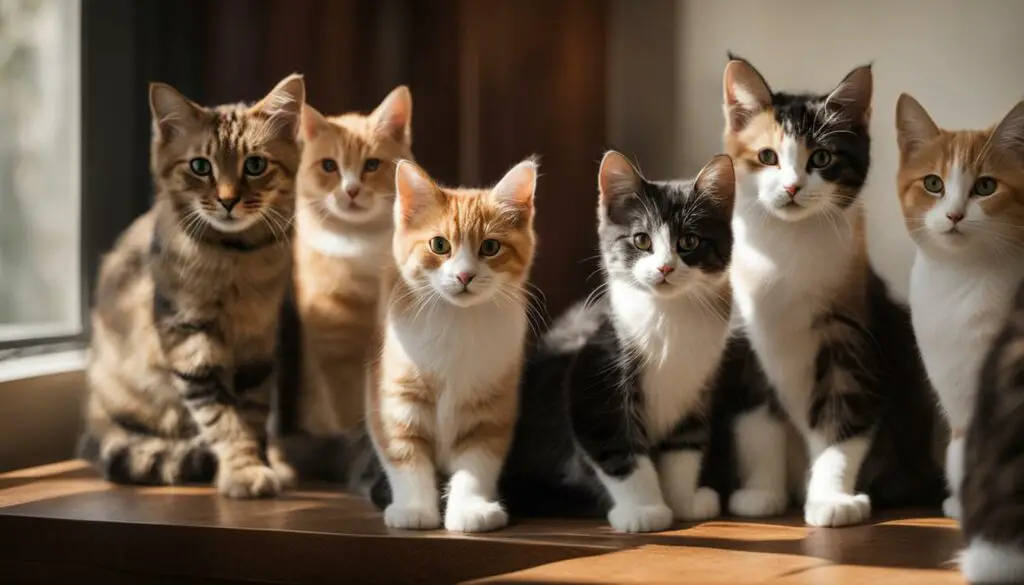
Social Behaviors of Cats
| Social Behavior | Description |
|---|---|
| Grooming | Cats groom themselves and each other as a bonding activity. |
| Play | Cats engage in play with other cats to establish social bonds and develop skills. |
| Body Language | Cats use body language cues to communicate their intentions and emotions to other cats. |
| Scent Marking | Cats mark their territory with scent to communicate their presence and establish social boundaries. |
| Vocalizations | Cats use a variety of vocalizations, such as purring and meowing, to communicate with other cats. |
“Cats are social animals that thrive on companionship and social interaction. Understanding their social behaviors allows us to create an environment that supports their natural instincts and helps them lead fulfilled lives.” – Dr. Jane Smith, Feline Behavior Expert
By acknowledging and nurturing the social nature of cats, we can strengthen our bond with them and provide them with a fulfilling and enriched life. Understanding their social behaviors, such as grooming, play, body language, scent marking, and vocalizations, allows us to better communicate and connect with our feline companions. By creating a social environment that meets their needs, we can ensure that our cats lead happy and content lives.
Communication in Cats
Communication is a fascinating aspect of feline behavior. While cats may not be as vocally expressive as some animals, they possess a wide range of vocalizations and body language cues that they use to convey their intentions and emotions.
Cats communicate through various vocalizations, including purring, meowing, hissing, and growling. Each vocalization serves a different purpose. For example, purring is often associated with contentment and relaxation, while meowing is a form of communication between cats and humans. By paying attention to the specific sounds your cat makes, you can gain insights into their needs and emotions.
In addition to vocalizations, cats also use body language to communicate. They express themselves through facial expressions, tail movements, and the position of their ears. For instance, a relaxed and raised tail signifies friendliness, while a puffed-up tail indicates fear or aggression. Understanding these body language cues can help you decipher what your cat is trying to communicate.
“Cats communicate through various vocalizations, including purring, meowing, hissing, and growling.”
By observing and interpreting both vocalizations and body language, you can develop a deeper understanding of your cat’s behavior and needs. This in turn will enable you to respond appropriately and strengthen your bond with your feline companion.
Understanding Cat Behavior
To effectively communicate with your cat, it is crucial to understand their behavior. Cats are territorial animals, and they rely on scent marking to communicate with other cats. They have scent glands on various parts of their bodies, such as the face and paws, which they use to mark their territory and communicate with other cats in the area.
It’s also important to recognize that cats are highly sensitive to changes in their environment. They thrive on routine and familiarity, and disruptions to their daily routines can cause stress and communication challenges. Providing a stable and consistent environment for your cat can promote positive communication and alleviate potential behavioral issues.
Additionally, each cat has its own unique personality and preferences. Some cats may be more vocal and expressive, while others may rely more on subtle body language cues. By spending time observing and interacting with your cat, you can learn to understand their individual communication style and establish a strong, trusting relationship.
The Role of Memory in Feline Behavior
Memory plays a crucial role in shaping a cat’s behavior and reactions. Cats have a remarkable ability to recall past events and interactions, which can influence their willingness to forgive. Just like humans, cats can remember both positive and negative experiences and use them to guide their behavior.
When it comes to forgiveness, a cat’s memory can be a determining factor. If a cat has had positive experiences with their owner, they are more likely to forgive and trust them again even after a negative encounter. On the other hand, if a cat has been mistreated or had negative experiences, they may be more cautious and less likely to forgive.
This ability to recall past events also extends to the cat’s environment and routine. Cats are creatures of habit, and any disruptions or changes in their surroundings can affect their behavior. For example, if a cat’s routine is suddenly altered or their environment becomes stressful, it may impact their ability to forgive and adapt.
The Impact of Memory on Cat Behavior
Understanding the role of memory in cat behavior can help pet owners create a more harmonious relationship with their feline companions. By providing a consistent and positive environment, reinforcing positive experiences, and avoiding negative ones, owners can help their cats feel safe and secure. This, in turn, can contribute to a more forgiving and trusting relationship between the cat and their owner.
| Positive Experiences | Negative Experiences |
|---|---|
| Building trust and strengthening the bond | Causing fear, anxiety, and mistrust |
| Creating a positive association with the owner | Creating a negative association with the owner |
It’s important to note that every cat is unique, and their ability to forgive and forget may vary. Some cats may be more forgiving and adaptable, while others may hold onto negative experiences for longer periods. By understanding the role of memory in feline behavior and taking steps to create a positive and consistent environment, pet owners can foster forgiveness and strengthen the bond with their feline companions.
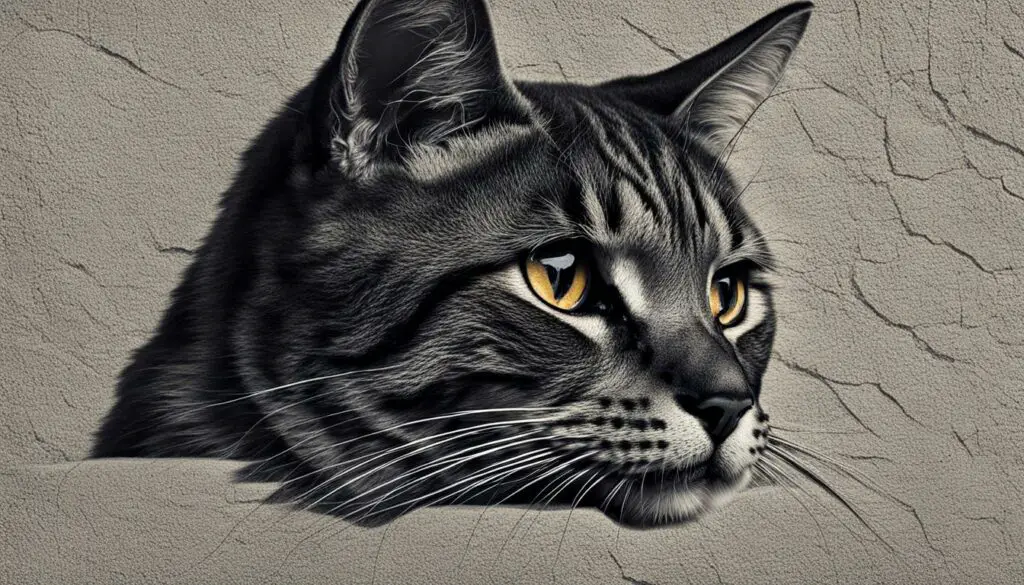
Factors Influencing Feline Forgiveness
Feline forgiveness is influenced by various factors that shape a cat’s willingness to let go of past conflicts or transgressions. Understanding these factors can help cat owners navigate their relationships with their feline companions and foster a more harmonious bond. The key factors influencing feline forgiveness include the bond between cats and their owners, cats’ ability to sense emotions, and the impact of their environment and routines.
The bond between a cat and its owner plays a significant role in feline forgiveness. Cats who have a strong sense of attachment and trust for their owners are more likely to forgive and move past conflicts. This bond is built through positive interactions, consistent care, and meeting the cat’s emotional and physical needs.
Cats possess a remarkable ability to sense and respond to human emotions. They are perceptive creatures who can pick up on subtle cues and changes in their environment. When cats sense that their owners are upset or remorseful, they may be more inclined to forgive and seek reassurance from their owners.
The environment and routines in which a cat lives also influence their capacity for forgiveness. Cats thrive in calm and predictable environments that promote feelings of security and stability. Changes in the environment or disruptions to their routines can impact a cat’s overall well-being and may make them less willing to forgive and forget.
| Factors Influencing Feline Forgiveness | Description |
|---|---|
| Bond between cats and owners | A strong bond built on trust and positive interactions increases the likelihood of forgiveness. |
| Cats’ ability to sense emotions | Cats can pick up on their owner’s emotions, which can influence their willingness to forgive. |
| Impact of environment and routine | Cats thrive in calm and predictable environments, and disruptions may affect their forgiveness. |
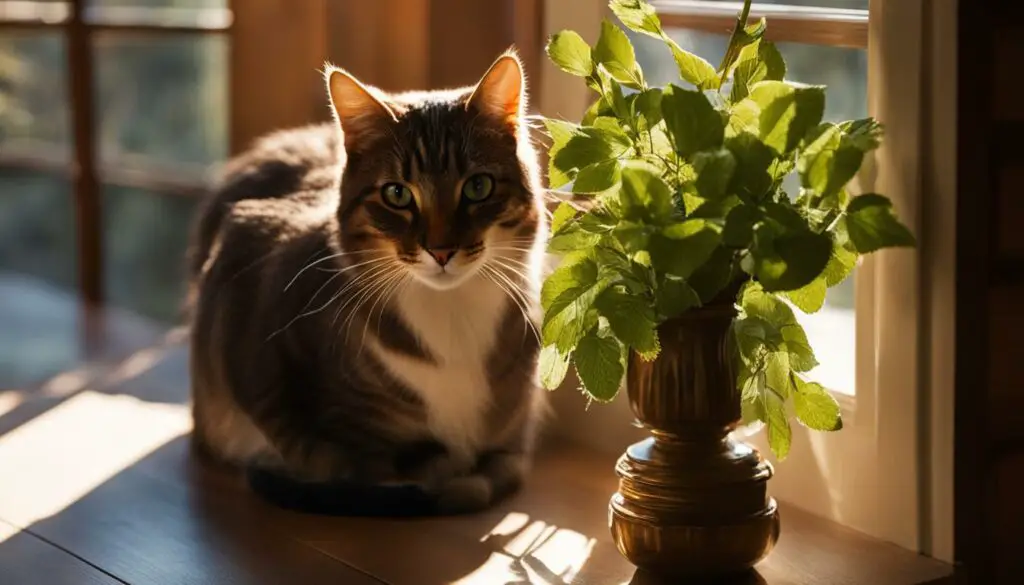
Understanding these factors and actively working to strengthen the bond with your cat, being mindful of their emotional state, and maintaining a stable environment can contribute to a more forgiving and peaceful relationship. Remember, every cat is unique, and it may take time and patience to build trust and foster forgiveness.
Comparing Feline Forgiveness to Other Animals
When it comes to forgiveness, cats have their own unique approach compared to other animals. While cats are known for their independent nature, they can still exhibit forgiving behavior under certain circumstances. However, it is interesting to compare their forgiveness to that of other animals, particularly dogs.
Dogs are often regarded as more forgiving than cats. They have a reputation for being loyal and eager to please their owners, which may contribute to their forgiving nature. Dogs have a strong bond with their human companions and are known to quickly forgive and forget if their owners show remorse or make amends.
On the other hand, cats have a more complex approach to forgiveness. They may hold onto negative experiences for longer periods and require more time and effort to rebuild trust. While cats can show forgiveness, it often depends on the specific circumstances and the strength of the bond they have with their owners.
It’s important to remember that each animal species has its own unique social behaviors and ways of handling conflict and forgiveness. While some animals may be more forgiving than others, it’s crucial to approach each animal with understanding, patience, and respect to foster a harmonious relationship.
| Feline Forgiveness | Forgiveness in Dogs | |
|---|---|---|
| Forgiveness Speed | Varies depending on the severity of the incident | Quick to forgive and forget |
| Rebuilding Trust | May take time and effort to rebuild trust | Forgiveness often leads to immediate trust restoration |
| Factors Influencing Forgiveness | Bond with owners, ability to sense emotions, and the environment | Strong bond with owners and the presence of remorse |
| Overall Forgiveness Capacity | Capable of forgiving with patience and understanding | Known for quick and unconditional forgiveness |
The Benefits of Feline Forgiveness
Feline forgiveness not only strengthens the bond between cats and their owners but also promotes a peaceful home environment and reduces stress for both cats and owners. When a cat forgives, it creates a harmonious and enjoyable relationship, benefiting both parties involved.
One of the key benefits of feline forgiveness is the strengthening of the human-cat relationship. When a cat forgives its owner, it shows a willingness to let go of past conflicts and move forward with a clean slate. This fosters trust and deepens the bond between the cat and its owner, leading to a more fulfilling and rewarding companionship.
Additionally, forgiving cats contribute to a peaceful home environment. When conflicts arise, and forgiveness is granted, tension is eased, and negative emotions are diffused. This creates a calm and harmonious atmosphere that is conducive to the wellbeing of both the cat and its owner. Reduced stress levels contribute to a happier and healthier life for both parties.
Cats are known to be sensitive creatures, and when they forgive, it helps reduce stress for both themselves and their owners. Forgiveness allows cats to let go of negative emotions and promotes a sense of relaxation and contentment. For owners, having a forgiving cat brings peace of mind, knowing that conflicts can be resolved, and the bond between them remains strong.

Table: Comparing Feline Forgiveness to Other Animals
| Feline Forgiveness | Forgiveness in Dogs | |
|---|---|---|
| Severity of Incidents | Minor incidents are usually forgiven within a few hours to days. | Can display forgiveness even in severe incidents. |
| Trigger Factors | Forgiveness influenced by the bond between cats and owners, the ability to sense emotions, and the impact of their environment and routines. | Forgiveness influenced by the bond between dogs and owners, training, and environmental factors. |
| Duration of Anger | Varies depending on the severity of the incident, but cats do not hold grudges and are more focused on self-protection. | Forgiveness can be swift, with dogs readily moving on from conflicts. |
| Impact on Relationship | Strengthens the bond between cats and owners, promoting a harmonious and enjoyable relationship. | Strengthens the bond between dogs and owners, fostering loyalty and trust. |
“Having a forgiving cat creates a harmonious and enjoyable relationship.”
- Feline forgiveness strengthens the bond between cats and their owners.
- Forgiveness promotes a peaceful home environment.
- Forgiving cats reduce stress for both cats and owners.
Overall, the benefits of feline forgiveness are far-reaching. By fostering forgiveness and understanding in our relationships with cats, we create a positive and enriching environment for both cats and humans alike.
Tips for Preventing Arguments with Your Cat in the Future
To maintain a harmonious relationship with your feline companion, it’s important to understand their behavior and take proactive steps to prevent arguments. By paying attention to their body language, using positive reinforcement, and strengthening the bond with your cat, you can create a peaceful and loving environment for both of you.
Understanding Cat Body Language
Cats communicate primarily through body language, so being able to interpret their signals is essential in avoiding conflicts. Some common signs of aggression or agitation include flattened ears, a swishing tail, dilated pupils, and hissing or growling. If you notice these cues, it’s best to give your cat space and avoid any actions that may escalate the situation.
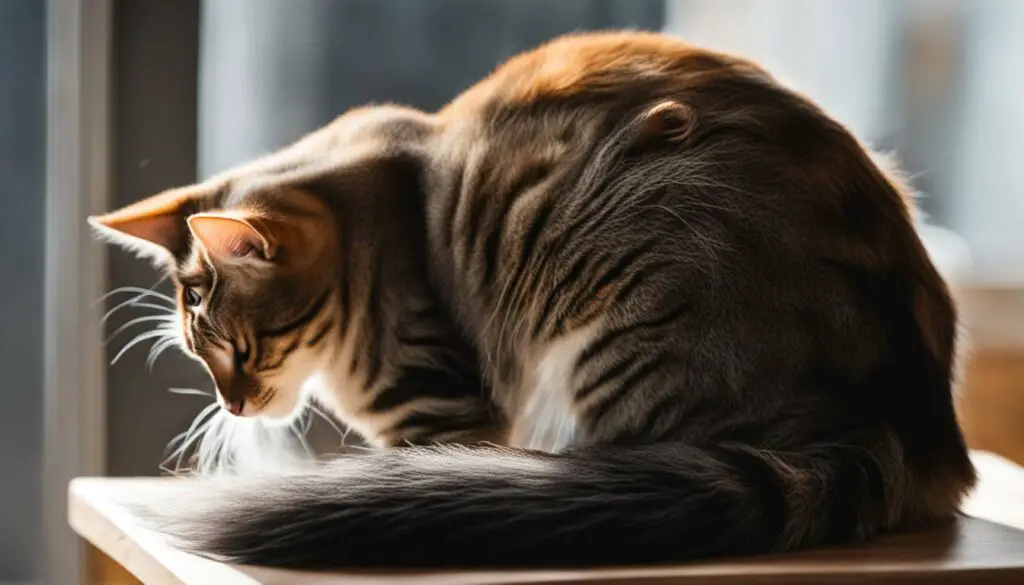
Positive Reinforcement
Instead of resorting to punishment, focus on positive reinforcement to encourage desirable behavior in your cat. Reward them with treats, praise, or playtime when they exhibit good behavior, such as using the litter box or scratching posts. This helps create a positive association and encourages them to repeat the behavior in the future.
Strengthening the Bond with Your Cat
A strong bond between you and your cat can minimize conflicts and increase their overall happiness. Spend quality time together by engaging in interactive play sessions or grooming your cat. Understanding their individual preferences and needs will deepen your connection and foster a sense of trust and security.
By implementing these tips, you can prevent arguments with your cat and build a strong and loving relationship. Remember, patience, empathy, and consistent positive reinforcement are key to creating a peaceful and harmonious environment for both you and your feline companion.
Anecdotal Evidence of Cats Forgiving Their Owners
Cats have a reputation for holding grudges, but anecdotal evidence suggests that they are actually forgiving creatures. Many cat owners have shared heartwarming stories of their furry friends forgiving them after unintentional mistakes or scolding. These anecdotes highlight the unique bond between cats and their owners and the capacity for forgiveness that cats possess.
One cat owner, Sarah, recalls accidentally stepping on her cat’s paw and expecting her cat to hold a grudge. However, to her surprise, the cat forgave her and showed no signs of resentment. Sarah believes that the strong bond and trust she had built with her cat played a significant role in the forgiveness she received.
I was devastated when I accidentally hurt my cat, but she forgave me so quickly. It made me realize the depth of our connection and how forgiving cats can be.
Another cat owner, Michael, shares a similar experience. After scolding his cat for scratching the furniture, he expected his cat to avoid him for days. However, within a few hours, the cat approached him, seeking affection and showing no signs of lingering anger. This incident made Michael appreciate the forgiving nature of cats and reinforced the importance of positive communication with his cat.
While these anecdotes provide subjective evidence, they reflect the forgiving nature that many cat owners have witnessed in their furry companions. Cats have a unique ability to move on from conflicts and continue nurturing their relationships with their owners, showcasing their capacity for forgiveness.

Table: Comparing Forgiveness in Cats and Other Animals
| Cats | Dogs | Rabbits | |
|---|---|---|---|
| Forgiveness Capacity | High | High | Low |
| Time to Forgive | Varies, but generally quick | Varies, but quicker than cats | Varies, but longer than cats |
| Trigger for Forgiveness | Bond with owner, positive experiences | Bond with owner, positive reinforcement | Bond with owner, gentle handling |
This table compares the forgiveness capacity and time to forgive in cats, dogs, and rabbits. It highlights that while cats and dogs have similar forgiveness capacities and triggers, cats may take slightly longer to forgive. Rabbits, on the other hand, have a lower forgiveness capacity and may require more time to forgive. Understanding these differences can help pet owners foster positive relationships with their furry companions.
How Long Does a Cat Stay Mad at You?
Understanding the duration of a cat’s anger is essential for maintaining a harmonious relationship with our feline companions. While the length of time a cat remains upset can vary depending on the severity of the incident, it is important to remember that cats do not hold grudges in the same way humans do. Instead of seeking revenge, they prioritize self-protection and maintaining a sense of security.
In general, minor incidents that upset a cat are typically forgiven within a few hours to a couple of days. Cats are known for their ability to quickly recover from small conflicts, especially when they feel reassured and loved by their owners. However, repeated actions that consistently upset or distress a cat can result in a more prolonged aversion.
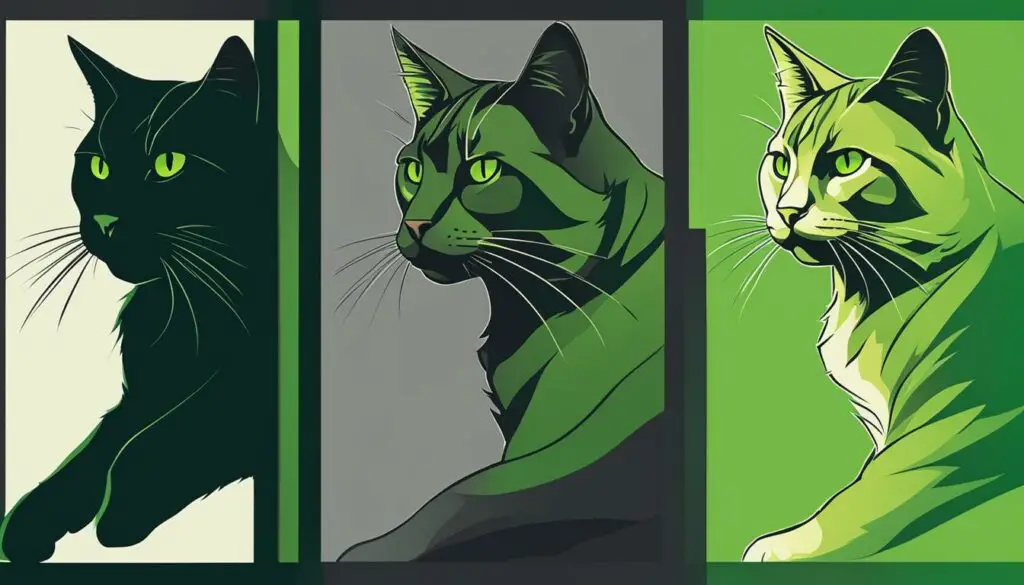
| Severity of Incident | Duration of Anger |
|---|---|
| Minor incidents | Usually forgiven within a few hours to a couple of days |
| Repeated actions causing distress | May lead to a longer aversion |
It is important to note that while cats may appear distant or aloof during this time, it is temporary and can be addressed with patience and understanding. Providing your cat with a calm and peaceful environment, along with consistent routines, can help accelerate their recovery from anger. Redirecting their attention through playtime and engaging in activities that they enjoy can also aid in dissipating their negative emotions.
In conclusion, while cats may show signs of anger or aversion after a conflict, they do not hold grudges in the same way humans do. Understanding their behavior, providing reassurance, and allowing them time to recover are key to maintaining a positive and loving relationship with our feline friends.
How to Help Your Cat Feel Less Moody
If your cat is feeling moody, there are several things you can do to help improve their mood and create a harmonious environment. Giving your cat space is essential, allowing them to calm down and regain their composure after an upset. Avoid forcing affection on them, instead, let them approach you on their own terms.
Providing attention and love is crucial in helping your cat feel less moody. Spend quality time with them, engaging in activities they enjoy such as playtime with their favorite toys. This not only strengthens the bond between you and your cat but also reinforces positive interactions.
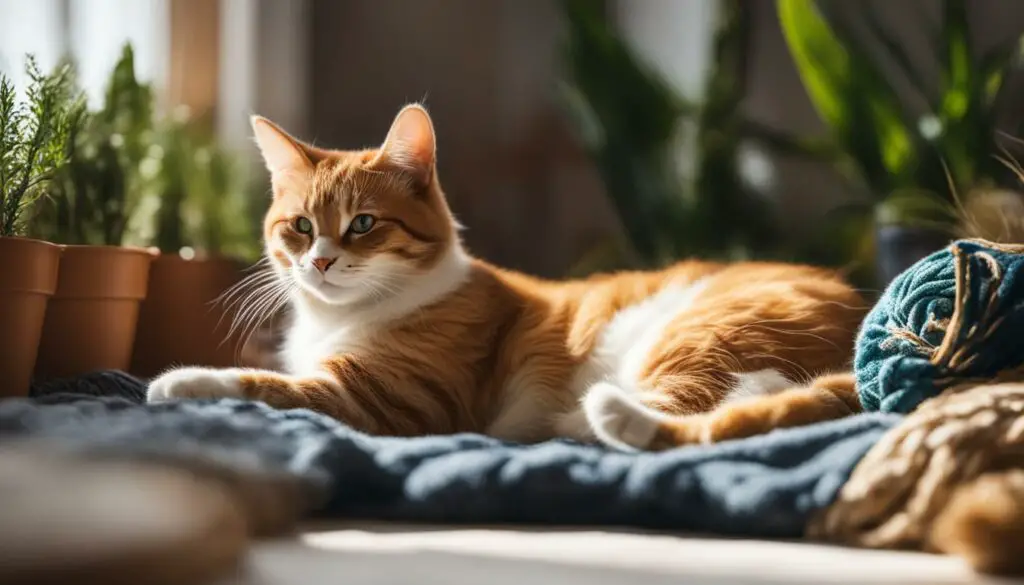
Additionally, ensure that your cat’s basic needs are met. Make sure they have access to fresh water, a clean litter box, and a comfortable resting area. Maintaining a consistent routine and a calm environment can contribute to their overall well-being and help alleviate their moodiness.
The Benefits of Having a Forgiving Cat as a Pet
Having a forgiving cat as a pet can bring numerous benefits to both you and your furry companion. One of the most significant advantages is the development of a strong bond between you and your cat. When a cat forgives you for any past conflicts or misunderstandings, it shows that they trust and value your relationship. This bond creates a sense of companionship and mutual understanding, enhancing the overall quality of your life together.
Another benefit of having a forgiving cat is the reduction of stress for both you and your pet. When conflicts or tensions arise, a forgiving cat is more likely to let go of negative emotions and move on. This can create a more harmonious and peaceful home environment, promoting a sense of calmness and tranquility. As a result, you and your cat can experience reduced stress levels, leading to improved well-being for both of you.
“Having a forgiving cat creates a harmonious and enjoyable relationship.”
Conclusion
Understanding feline behavior is the key to unlocking the fascinating world of cats and their capacity for forgiveness. Contrary to their independent reputation, cats are social animals that form strong bonds with their owners and communicate through various vocalizations and body language. Memory also plays a role in their behavior, as they can recall past experiences and use them to shape their reactions.
Several factors influence a cat’s willingness to forgive, including the bond between cats and their owners, their ability to sense emotions, and the impact of their environment and routines. By strengthening the bond with our cats and providing a calm and predictable environment, we can encourage forgiveness and promote a harmonious relationship.
Having a forgiving cat as a pet comes with numerous benefits, including a stronger bond, reduced stress, and increased affection. By understanding feline behavior and practicing positive reinforcement, we can prevent conflicts and create a loving and peaceful home environment. Remember, cats are capable of forgiving and moving on from past conflicts, allowing us to deepen our connection with these incredible creatures.
FAQ
Are cats forgiving?
Yes, cats can be forgiving creatures.
What factors influence feline forgiveness?
The bond between cats and their owners, their ability to sense emotions, and the impact of their environment and routines can influence a cat’s willingness to forgive.
How do cats communicate?
Cats communicate through various vocalizations and body language cues.
Do cats have good memories?
Cats have impressive memories and can recall past experiences and interactions.
How long does a cat stay mad at you?
The duration of a cat’s anger can vary depending on the severity of the incident.
How can I prevent arguments with my cat?
Understanding your cat’s body language, using positive reinforcement, and strengthening the bond with your cat can help prevent conflicts.
Are there any benefits to having a forgiving cat as a pet?
Yes, having a forgiving cat strengthens the bond with your cat, reduces stress for both of you, and increases affection.

